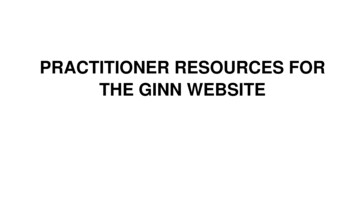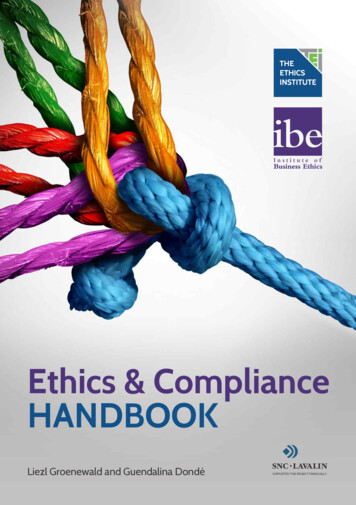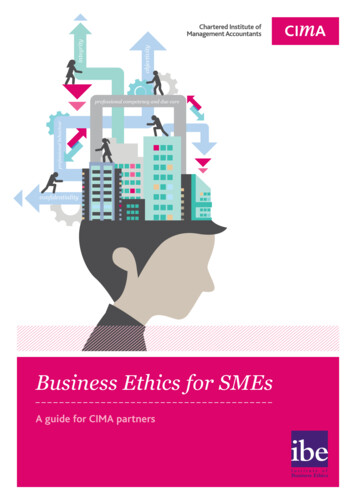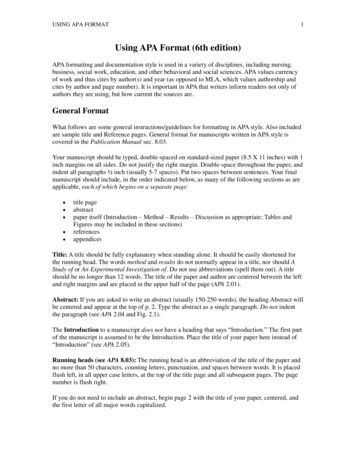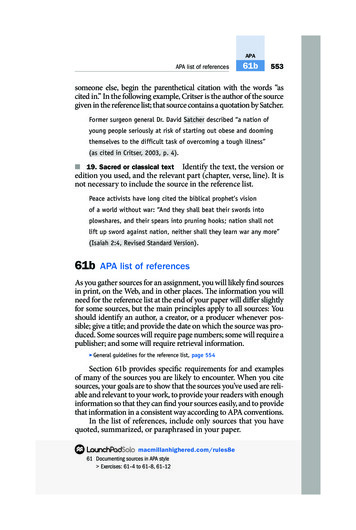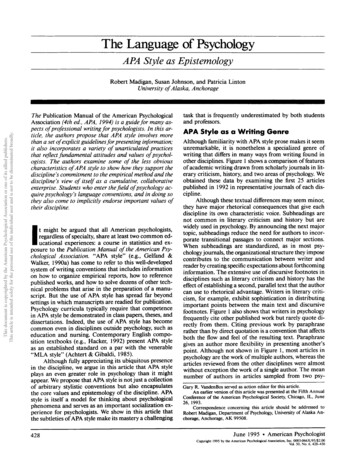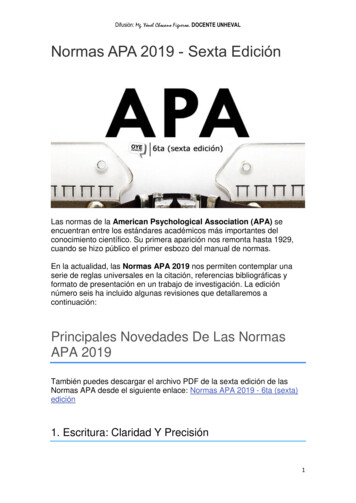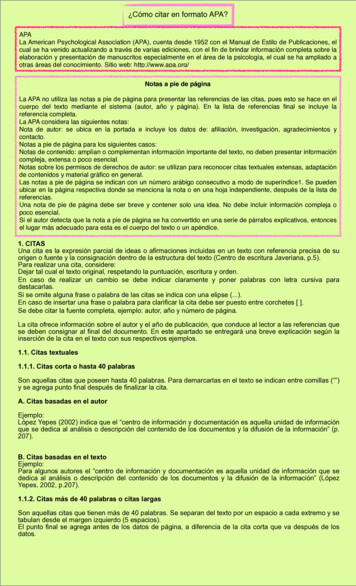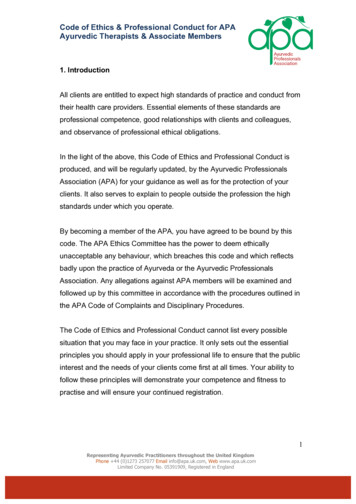
Transcription
Code of Ethics & Professional Conduct for APAAyurvedic Therapists & Associate Members1. IntroductionAll clients are entitled to expect high standards of practice and conduct fromtheir health care providers. Essential elements of these standards areprofessional competence, good relationships with clients and colleagues,and observance of professional ethical obligations.In the light of the above, this Code of Ethics and Professional Conduct isproduced, and will be regularly updated, by the Ayurvedic ProfessionalsAssociation (APA) for your guidance as well as for the protection of yourclients. It also serves to explain to people outside the profession the highstandards under which you operate.By becoming a member of the APA, you have agreed to be bound by thiscode. The APA Ethics Committee has the power to deem ethicallyunacceptable any behaviour, which breaches this code and which reflectsbadly upon the practice of Ayurveda or the Ayurvedic ProfessionalsAssociation. Any allegations against APA members will be examined andfollowed up by this committee in accordance with the procedures outlined inthe APA Code of Complaints and Disciplinary Procedures.The Code of Ethics and Professional Conduct cannot list every possiblesituation that you may face in your practice. It only sets out the essentialprinciples you should apply in your professional life to ensure that the publicinterest and the needs of your clients come first at all times. Your ability tofollow these principles will demonstrate your competence and fitness topractise and will ensure your continued registration.1Representing Ayurvedic Practitioners throughout the United KingdomPhone 44 (0)1273 257077 Email info@apa.uk.com, Web www.apa.uk.comLimited Company No. 05391909, Registered in England
Code of Ethics & Professional Conduct for APAAyurvedic Therapists & Associate MembersIf you need any advice on a professional or ethical matter on which thiscode is not completely clear, or if you are uncertain as to how to behave inany clinical or other situation, you are advised to consult the director of theAPA Ethics Committee for guidance. If the director considers that givingadvice may conflict with the regulatory functions of the APA, he or she willrefer you to an independent adviser.APA members are herewith reminded that this code represents only theminimally accepted standards of legal and ethical professional conduct inthe United Kingdom at the present time. The primary reason for adhering tothem is the well-being of the client, the public, of colleagues and theprofession.2. General Duties and Responsibilities of Ayurvedic Therapists,Affiliates and Associate MembersClients must be able to trust therapists with their health and well-being. Tojustify that trust, we as a profession have a duty to maintain high standardsof practice and care and to show utmost respect for life in all its aspects.As a member of the APA you are therefore expected to: practise always in compliance with the philosophy and principles oftraditional Ayurveda put the well-being of your clients before all other considerations cultivate and promote your own personal development, well-beingand self-respect alongside your clients’ welfare2Representing Ayurvedic Practitioners throughout the United KingdomPhone 44 (0)1273 257077 Email info@apa.uk.com, Web www.apa.uk.comLimited Company No. 05391909, Registered in England
Code of Ethics & Professional Conduct for APAAyurvedic Therapists & Associate Members take care of your own health and recognise that this is yourresponsibility, both for your own sake and that of your clients be honest and trustworthy and never abuse your professional position cause no harm to clients and protect them from any risk of harm treat all those who request your care regardless of religion,nationality, race, culture, sex, politics, disability or social standing respect the dignity, individuality and privacy of your clients listen attentively to your clients and respect their point of view take the time to explain your findings and treatments to your clientsand to ensure, as far as possible, that they understand what you tellthem respect the right of your clients to take part in decisions about theirtreatment and actively involve them, to the extent that they are able,in their health plan respect the autonomy of your clients and encourage their freedom ofchoice ensure that your personal beliefs do not interfere with your care ofclients respect and protect confidential information3Representing Ayurvedic Practitioners throughout the United KingdomPhone 44 (0)1273 257077 Email info@apa.uk.com, Web www.apa.uk.comLimited Company No. 05391909, Registered in England
Code of Ethics & Professional Conduct for APAAyurvedic Therapists & Associate Members recognise and always work within the limits of your professionalcompetence refer every clients whose condition is beyond your expertise be willing to consult and cooperate with colleagues from your ownand other health care professions respond promptly and constructively to any criticism or complaintfrom any source continue to update your professional knowledge and skills inaccordance with the current CPD policies of the APA observe and abide by the Constitution of the APA be covered by professional and public liability insurance make no claim for the cure of any specific illness or disease refrain from using any titles or descriptions suggesting medical,academic or educational qualifications unless you possess them.As an Ayurvedic therapist you must be familiar with all laws or regulationsrelevant to the practice of Ayurveda in the locality in which you practise. Youmust obey the provisions of all health, safety and employment legislation inforce at any time. Furthermore, it is your responsibility to ensure that youbecome aware of any legal changes that may affect your practice.4Representing Ayurvedic Practitioners throughout the United KingdomPhone 44 (0)1273 257077 Email info@apa.uk.com, Web www.apa.uk.comLimited Company No. 05391909, Registered in England
Code of Ethics & Professional Conduct for APAAyurvedic Therapists & Associate Members3. Relationship with ClientsYour relationship with your clients is a professional one based on trust. Toestablish and maintain that trust, you must be always polite, considerate andhonest. Good communication is paramount and involves listening attentivelyto clients, respecting their point of view, and never allowing your own beliefsand values to influence adversely the therapeutic relationship. Although youare free to choose who you accept as a client, you must not solicit anyclient.3.1. ConsentYou must respect the right of patients to be fully involved in decisions abouttheir care. It is their entitlement to accept or refuse your advice or treatment.Before you provide treatment or investigate a patient’s condition, you mustensure, wherever this is possible, that the patient has understood what youpropose to do and why. It is your duty to explain, and obtain informedconsent for, all involved procedures. In giving consent, the patient musthave been informed of any probable risk or side effect. An example consentform is appended at the end of this document, should you choose to obtainwritten consent prior to treatments given by you. You should ensure that theconsent of patients is voluntary and that they are not under any form ofduress from health professionals, family or friends. However, giving andobtaining consent is always a process, not a one-off event. Patients canchange their mind and withdraw their consent at any time.Any physical examination or treatment requires the patient’s consent, or theconsent of the person legally responsible for the interests of the patient. Anexamination or treatment of any intimate area requires the presence of a5Representing Ayurvedic Practitioners throughout the United KingdomPhone 44 (0)1273 257077 Email info@apa.uk.com, Web www.apa.uk.comLimited Company No. 05391909, Registered in England
Code of Ethics & Professional Conduct for APAAyurvedic Therapists & Associate Membersthird party unless the patient explicitly requests otherwise.A patient from whom informed consent for examination or treatment issought must possess the necessary intellectual and legal capacity to giveconsent. A patient will have this intellectual capacity, if he or she is able tounderstand in simple language what the examination or treatment is, itspurpose and why it is being proposed, its principal benefits as well as risksand alternatives, and to retain the information for long enough to make aneffective decision based on free choice.In case you are treating a client who is under the age of 16 or who isintellectually challenged, the informed consent of the parent or guardian orthe person legally responsible is necessary. If you treat such a client, aparent or the legally authorised guardian must be present in the treatmentroom throughout the whole of the treatment. No other person may performthis role without the explicit written consent of the parent or the legallyauthorised guardian.You should also be aware that the refusal of treatment by a child under 16may carry legal force and override the consent, even though properly given,of a legally authorised adult. In the event of a conflict between such a clientand a parent or guardian or between parents, you ought to seek legaladvice.3.2. Maintaining TrustTrust in a client-therapist relationship is an essential part of the healingprocess. To establish and maintain trust you must: be courteous and truthful6Representing Ayurvedic Practitioners throughout the United KingdomPhone 44 (0)1273 257077 Email info@apa.uk.com, Web www.apa.uk.comLimited Company No. 05391909, Registered in England
Code of Ethics & Professional Conduct for APAAyurvedic Therapists & Associate Members respect the privacy and dignity of your clients respect your clients’ right to decline to take part in teaching orresearch and ensure that their refusal does not adversely affect yourrelationship with them respect the right of clients to a second opinion ensure that your clients have clear information about your practicearrangements and how they can contact you.Other important aspects of establishing and maintaining trust are ethicalboundaries, confidentiality and good communication:3.2.1. Ethical BoundariesYou must not allow your personal relationships to undermine the trust whichclients place in you. You may find yourself called upon to treat professionallysomeone who is a friend, or a client may become your friend. This isacceptable, provided you keep a clear line, understood by both sides,between the social and the professional relationship.In particular, you must never use your professional position to establish orpursue a sexual relationship with a client or someone close to them. Youmust also be aware of the dangers of allowing any sort of emotionalrelationship to develop with a client. If you realise you are becomingemotionally or sexually involved with a client, you should end theprofessional relationship and recommend to the client an alternative sourceof appropriate care.You must ensure that your behaviour in dealing with clients is professionalat all times and not open to misunderstanding or misinterpretation. Nonphysical behaviour, gesture, unnecessary physical contact, verbal7Representing Ayurvedic Practitioners throughout the United KingdomPhone 44 (0)1273 257077 Email info@apa.uk.com, Web www.apa.uk.comLimited Company No. 05391909, Registered in England
Code of Ethics & Professional Conduct for APAAyurvedic Therapists & Associate Memberssuggestion or innuendo can easily be construed as abusive or harassing.There is always the possibility that some clients may experience anyphysical contact as invasive and intimate. It is therefore important beforemaking any contact in the course of your treatment that you have explainedfully what the treatment entails, and have obtained full consent.In particular full body massage must be done with the utmost respect for thedignity of clients. You need to be aware, especially in the case of crossgender massage, of the vulnerable position in which you place the client andyourself. If there is an accusation of inappropriate conduct, even when youractions are completely beyond reproach, it is your word against the client’s.You may consider it appropriate, at times, to have a third party present whilegiving cross-gender massage.If a client shows signs of becoming inappropriately involved with you, youshould discourage them and, if necessary, end the professional relationship.In your own interest, you may wish to report such matters to the APA EthicsCommittee or seek advice from a colleague, whilst maintaining theanonymity of the client.You must allow your client’s privacy, if they are required to undress fortreatments, and you must also ensure that you provide adequate cleangowns or blankets for their use.3.2.2. ConfidentialityThe relationship of trust that underlies all health care requires that youobserve the rules of confidentiality in your dealings with clients. Unless youdo this, clients will be reluctant to give you the information you need to8Representing Ayurvedic Practitioners throughout the United KingdomPhone 44 (0)1273 257077 Email info@apa.uk.com, Web www.apa.uk.comLimited Company No. 05391909, Registered in England
Code of Ethics & Professional Conduct for APAAyurvedic Therapists & Associate Membersprovide good care.All information, medical or otherwise, concerning a client is confidential.Such information may only be released with the explicit consent of the client.The very fact of a client’s attendance at your clinic must also be consideredconfidential. Confidential information must not be revealed even tomembers of the client’s family, except to parents or persons legallyresponsible for the client’s interests. This duty of confidentiality, whichsurvives the client’s death, also extends to anyone you may employ in yourpractice.Disclosures without consent may be necessary in the public interest, i.e.when your duty to society overrides your duty to your clients. This willusually happen when clients put themselves or others at serious risk, forexample by the possibility of a violent or criminal act. Even then, you mustfirst make every reasonable effort to persuade such clients to change theirbehaviour and to disclose information themselves. If you cannot persuadethem to do this, you should disclose the information to an appropriateperson or authority, taking legal advice first. You must be able, if necessary,to justify your actions.You may disclose confidential information without consent, if: disclosure is required by statute or law you believe it to be in the client’s interest to disclose such informationto another health care professional you believe it to be essential for the sake of your client’s health todisclose such information to someone other than a healthprofessional.9Representing Ayurvedic Practitioners throughout the United KingdomPhone 44 (0)1273 257077 Email info@apa.uk.com, Web www.apa.uk.comLimited Company No. 05391909, Registered in England
Code of Ethics & Professional Conduct for APAAyurvedic Therapists & Associate MembersIn cases where disclosure is considered appropriate, you must: inform the client, before disclosure takes place, of the extent ofinformation to be disclosed, the reason for the disclosure, and wherepossible, of the likely consequences disclose only such information as is relevant, and ensure that theinformation is held in an appropriate manner by the person to whom itis disclosed record in writing both the information disclosed and the reasons fordisclosure be prepared to justify your decision.There are also circumstances when it may be appropriate to contact anotherhealth care professional without the client’s consent (e.g. in cases ofthreatened suicide) or even without their knowledge (e.g. when abuse issuspected).In case you are required or requested to give evidence or discloseinformation to a court or other tribunal, you should do so with care.Whatever evidence is given, you must be independent and impartial.3.2.3. Good CommunicationGood communication between you and your clients is essential for effectivecare and relationships of trust. Good communication involves: listening attentively to your clients and respecting their views andbeliefs giving clients all possible information about their condition and your10Representing Ayurvedic Practitioners throughout the United KingdomPhone 44 (0)1273 257077 Email info@apa.uk.com, Web www.apa.uk.comLimited Company No. 05391909, Registered in England
Code of Ethics & Professional Conduct for APAAyurvedic Therapists & Associate Memberstreatment plan in language they can understand sharing information with a patient’s partner, close relative or carers, ifthey ask you to do so, having first obtained the client’s consent.If a person under your care has suffered harm, through misadventure or forany other reason, you should act immediately to make matters right, if that ispossible. You must explain fully and promptly to the client what hashappened and the likely long-term and short-term effects. Whereappropriate you should offer an apology.If the client is an adult who lacks understanding capacity, the explanationshould be given to a person with responsibility for the client, or the client’spartner, close relative or close friend who has been involved in the closecare of your client, unless you have reason to believe your client would haveobjected to the disclosure. In the case of children the situation should beexplained honestly to those with parental responsibility and to the child, ifthe child has the maturity to understand the issues.3.3. ResearchWhen taking part in clinical trials, clinical audit, case-history reporting,qualitative research or any other method of research, you must ensure that: where appropriate, you adhere to research protocol which has beenapproved by the Ethics Committee, current professional guidance issought, adequate records are maintained and true findings arereported informed consent is obtained from any client the care of clients taking part in the research is not compromised inorder to meet the aims of your research11Representing Ayurvedic Practitioners throughout the United KingdomPhone 44 (0)1273 257077 Email info@apa.uk.com, Web www.apa.uk.comLimited Company No. 05391909, Registered in England
Code of Ethics & Professional Conduct for APAAyurvedic Therapists & Associate Members the confidentiality of the client is maintained.If the results of research cannot be aggregated in such a way as to concealthe identity of individual clients, any consent obtained from the client for theuse of such results must be based on full details of the distribution,publication and ownership of these results.3.4. Notifiable DiseasesIt is a statutory requirement (under the Public Health Infectious DiseasesRegulations 1988) that certain infectious diseases are notified to the MedicalOfficer of Health of the district in which your client resides or lives in whenthe disease is diagnosed. The person responsible for notifying is the client’sGP. If therefore, you discover a notifiable disease, which is clinicallyidentifiable as such, you should ensure that the client’s GP is promptlyinformed. Each local authority decides which diseases must be notified in itsarea. There may be therefore local variations, but the list generally includes: Acute encephalitis Acute meningitis Anthrax Acute poliomyelitis Cholera Diphtheria Dysentery Food poisoning Infective jaundice Leprosy Leptospirosis Malaria Measles12Representing Ayurvedic Practitioners throughout the United KingdomPhone 44 (0)1273 257077 Email info@apa.uk.com, Web www.apa.uk.comLimited Company No. 05391909, Registered in England
Code of Ethics & Professional Conduct for APAAyurvedic Therapists & Associate Members Meningitis Meningococcal septicaemia Mumps Ophthalmia neonatorum Paratyphoid fever Plague Rabies Relapsing fever Rubella Scarlet fever Small Pox Tetanus Tuberculosis Typhoid fever Typhus fever Viral haemorrhagic fever Viral hepatitis (A, B, C and other) Whooping cough Yellow fever3.5. Ending Professional Relationships with ClientsIf you have good reason to end a professional relationship, e.g. where aclient has been violent to you or a colleague, or for other reasons wheretrust has been broken, you need to inform your client personally either orallyor in writing. In such circumstances you must be sure your decision is fairand be prepared to justify your decision if called on to do so. Whereappropriate you should arrange for the further care of your client to beassumed by another health care professional.13Representing Ayurvedic Practitioners throughout the United KingdomPhone 44 (0)1273 257077 Email info@apa.uk.com, Web www.apa.uk.comLimited Company No. 05391909, Registered in England
Code of Ethics & Professional Conduct for APAAyurvedic Therapists & Associate Members4. Relationship with Colleagues4.1. Communication with other Health Care ProfessionalsYou should work in cooperation with other therapists and health careprofessionals to obtain best results for each individual client. At times thismay simply be a matter of communication in your mutual care of the client,or you might want to refer your client to another health care professional,when you feel that their condition is outside your competence.When communication with another health care professional with a view todialogue or referral is indicated, you should inform your client of the reasonsfor this and discuss the matter with your client. Whatever the type ofcommunication with the other health care professional, a copy of allcommunication should be made and kept in your client’s file or a filededicated to professional case correspondence. A copy of suchcorrespondence should be made available to your client on request.If a client decides to transfer from you to another health care professional, itis courteous and in their best interest, for you and the other professional tocommunicate with each other about this transfer, and for relevantinformation about your client to be forwarded, always with the client’sconsent.You must never attempt to persuade the client of another health careprofessional to seek treatment with you. If you treat the client of anotherhealth care professional in their absence, due to holiday, illness or any otherreason, you must not attempt to solicit the client to continue treatment withyou.14Representing Ayurvedic Practitioners throughout the United KingdomPhone 44 (0)1273 257077 Email info@apa.uk.com, Web www.apa.uk.comLimited Company No. 05391909, Registered in England
Code of Ethics & Professional Conduct for APAAyurvedic Therapists & Associate Members4.2. Honourable ConductYou must at all times conduct yourself in an honourable manner in yourrelations with other colleagues and health care professionals. It isinappropriate to openly criticise treatment prescribed or administered byanother health care professional or to countermand such treatments.Differences of opinion are to be expected, and opinions should always bepresented in an unambiguous and tactful manner.You must not undermine a patient’s trust in the care or treatment theyreceive, or in the judgement of those treating them, by making malicious orunfounded criticism of colleagues. If you hear such criticism voiced byclients or colleagues, you must act with the utmost discretion andprofessionalism and be extremely cautious about voicing any criticalopinion, even if you hold such critical views.If you have evidence or reliable information that a health care professional’sconduct, health or professional work pose a threat to clients, you have aresponsibility to act to protect the clients’ safety. You are advised to reportyour concerns to the APA Ethics Committee or, if necessary, to a relevantlegal authority.5. Relationship with the Public5.1. Honourable ConductYou must conduct yourself at all times in an honourable manner in yourrelationship with the public. Public communication may include advertising,contact through the media (newspapers and other publications, television,15Representing Ayurvedic Practitioners throughout the United KingdomPhone 44 (0)1273 257077 Email info@apa.uk.com, Web www.apa.uk.comLimited Company No. 05391909, Registered in England
Code of Ethics & Professional Conduct for APAAyurvedic Therapists & Associate Membersradio, world-wide-web), talks to the public and discussions with enquirers. Inall these instances you are required to conduct yourself in a mannercongruent with the Code of Ethics and Professional Conduct, and to avoidmisleading claims to curing disease or in any way implying abilities beyondyour competence.5.2. AdvertisingYou should provide clients, colleagues and other professionals with goodquality, factual information about your professional qualifications, theservices you provide and your practice arrangements. You should do this ina way that puts clients first and preserves their trust.All your advertising must be decent, truthful and compliant with legalrequirements and the British Code of Advertising Practice. It must notmislead or deceive, be sensational, or make unrealistic claims. It is also notacceptable to canvass either from door to door, by telephone or by postalmeans. In advertising, you must never denigrate colleagues and otherprofessionals, make any claim to cure disease or put prospective clientsunder pressure. Your advertising should always be in the best interests ofthe public and your profession.Only professional qualifications from accepted organisations or degreesconferred by established universities should be displayed in youradvertising. In case you advertise qualifications obtained abroad, you muststate their country of origin.You must not mislead a client into believing that you are a medical doctor,unless you are legally recognised as such within the country in which youpractice. If you possess doctorates in other subjects, you must make it clear16Representing Ayurvedic Practitioners throughout the United KingdomPhone 44 (0)1273 257077 Email info@apa.uk.com, Web www.apa.uk.comLimited Company No. 05391909, Registered in England
Code of Ethics & Professional Conduct for APAAyurvedic Therapists & Associate Membersthat, whilst being able to use the doctor title, you are not a medical doctor.5.3. TeachingYou are encouraged to promote the knowledge of Ayurveda through publiclectures, courses and workshops given to other health care professionalsand to the general public. These presentations must be seen to be of aninformative nature and not claim to give any formal training unless as part ofan APA-approved programme.6. Competence and Continuing Professional Development (CPD)In the interests of your clients, the profession and your own level ofcompetence and expertise, you must keep your knowledge and skills up-todate throughout your working life by regularly attending recognised CPDprogrammes, which maintain and further develop your capabilities andperformance. It is your duty to read and retain relevant documents receivedfrom the APA or other professional associations.Where offering another therapy, apart from Ayurveda, you must ensure thatyour training is adequate, that you remain aware of changes in that therapy,and that, where possible, you remain registered with the relevantprofessional association.You also must ensure that you are aware of current practice in other healthcare professions and that you keep up-to-date with the current laws andstatutory codes of practice that affect your work.17Representing Ayurvedic Practitioners throughout the United KingdomPhone 44 (0)1273 257077 Email info@apa.uk.com, Web www.apa.uk.comLimited Company No. 05391909, Registered in England
Code of Ethics & Professional Conduct for APAAyurvedic Therapists & Associate Members7. Problems with Your HealthThe interests and safety of clients must come first at all times. If you knowthat you have a serious condition, which you could transmit to clients, or thatyour judgement or performance could be significantly affected by a conditionor illness, or its treatment, then you must take and follow advice from aconsultant in occupational health or another suitably qualified colleague onwhether, and in what ways, you should modify your clinical practice. Do notrely on your own assessment of the risk you pose to clients.The above paragraph also applies, if you have become dependent onalcohol or any other drug, prescribed or otherwise, to an extent, which mayaffect your practice.8. Practice Management8.1. PremisesYou must practise from premises that are appropriate for the professionalpractice of Ayurveda. If you work from your private home, consultations andtherapies must be carried out in treatment rooms not otherwise used forordinary domestic purposes.If you work alone in your own home or other premises, you should be awareof the need for caution, particularly when seeing a patient for the first time. Itmay be necessary sometimes to take sensible precautions, such as askinganother person to be on the premises during a session.18Representing Ayurvedic Practitioners throughout the United KingdomPhone 44 (0)1273 257077 Email info@apa.uk.com, Web www.apa.uk.comLimited Company No. 05391909, Registered in England
Code of Ethics & Professional Conduct for APAAyurvedic Therapists & Associate MembersAll signs and nameplates should be within the boundaries of professionaldiscretion, and you should only display certificates and diplomas from bonafide educational establishments and professional registers.Your premises must comply with all relevant current health and safetyregulations to ensure that there is adequate lighting, heating, ventilation,electrical installations, toilets, wheel chair access, smoke al
Code of Ethics & Professional Conduct for APA Ayurvedic Therapists & Associate Members Representing Ayurvedic Practitioners throughout the United Kingdom Phone 44 (0)1273 257077 Email info@apa.uk.com, Web www.apa.uk.com Limited Company No. 05391909, Registered in England 1 1. Introduction
